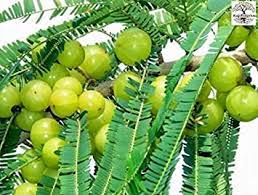Emblica Officinalis (Indian gooseberry, Amla)

Biological Name:
Emblica officinalis
Family:
Phyllanthaceae
Other Names:
Amalakam, Amalaki, Amla, Amlabaum, Amlaj, Amulch, An mole, Emblic myrobalan, Indian gooseberry, Kalpaamruthaa, Nelli, Shabju, Sriphalam, Toppinelli, Emblic, Emblic myrobalan, Myrobalan, Malacca tree.
Habitat:
Amla is a very common plant in India. It can be easily found growing in semi – arid regions and plains of northern India. Uttar Pradesh, Tamil Nadu, Rajasthan and Madhya Pradesh, Pakistan, Uzbekistan, Sri lanka, South East Asia, China and Malaysia.
Additional Info:
- According to Ayurveda, amla fruit is sour (amla) and astringent (kashaya) in taste (rasa), with sweet (madhura), bitter (tikta) and pungent (katu) secondary tastes (anurasas).
- Its qualities (gunas) are light (laghu) and dry (ruksha), the postdigestive effect (vipaka) is sweet (madhura) and its energy (virya) is cooling (shita).
Elements Applied:
Dried fruits, Fresh fruit, seed, leaves, root bark, flowers.
Active Components:
phytochemicals such as gallic acid, ellagic acid, pyrogallol, some nor-sesquiterpenoids, corilagin, geraniin, elaeocarpusin, and rodelphinidins B1 and B2, different tannins, minerals, vitamins, amino acids, fixed oils and flavonoids like rutin and quercetin.
History:
An ancient Seer, Chyavan, was rejuvenated by Ashwini kumar by a preparation, chiefly containing fruits of Amla. Since then, Amalaki is used as a traditional household plant in India. On Amalaki Ekadashi day the Amla tree is worshipped. It is believed that Hari himself resides in this tree. This day also marks the beginning of Holi festival. Amalaki Ekadashi is observed during the waxing phase of the moon in Phagun month (February – March). An interesting story was once narrated by Sage Vasishta and is found in the Brahmanda Purana. People who observe a fast on this day listen to a recital of Amalaki Ekadasi Vrat Katha during the fast.
Used for:
- Stress reliever which helps induce sleep and relieve headaches.
- Beneficial against respiratory disorders. It helps to reduce cough, tuberculosis, throat infections and flu.
- Rich source of iron, deficiency of which causes anemia.
- Active blood purifier when consumed with honey.
- Diuretic in nature. It means that Indian Gooseberry helps increase the volume and frequency of urination which improves the elimination of toxins from the body. Know more on detoxification .
- Riich in dietary fiber which helps improve the overall digestion process. Know more on how to improve digestion .
- Antibacterial & Astringent properties which help improve the body's immunity system. Indian Gooseberry also increases white blood cells which help flush out the toxins from the body.
- Absorbing calcium which is an essential element for teeth, bones & hair.
- Reduces the number of free radicals in the body through its antioxidant properties. It helps reduce wrinkles, dark circles and other signs of aging. It also protects the body from radiation.
- Improves nerve health facilitating proper blood flow. It helps to prevent diseases like dementia and Alzheimer’s. Indian Gooseberry also helps improve concentration power and memory skills and reduces Stress.
- Boost metabolism which helps reduce body fat. It is recommended to add Amla in one's daily diet.
- Flush out the harmful toxins from the body reducing skin blemishes. The astringent properties of Indian Gososeberry help tighten the pores, giving you clear and healthy skin.
- Used in a lot of shampoos and conditioners owing to its rich antioxidant & iron content. Indian Gooseberry contains high levels of Vitamin C which helps reduce hair fall. It also strengthens the roots & maintains hair color. Antibacterial properties of Amla helps fight dandruff.
- Rich in carotene content which is well known for its powerful effect on vision-related conditions. Formulation made of Indian Gooseberry and Honey helps to improve eyesight, near-sightedness, and cataracts.
- Amla possesses anti-pyretic, analgesic, anti-tussive, anti-atherogenic, adaptogenic, cardio-protective, gastroprotective, anti-anemia, anti-hypercholesterolemia, wound healing, anti-diarrheal, anti-atherosclerotic, hepatoprotective properties.
- It has nephroprotective, neuroprotective, radiomodulatory, chemomodulatory, chemopreventive effects, free radical scavenging, antioxidant, anti-inflammatory, antimutagenic and immunomodulatory properties.
Safety:
3-5 grams, (3-5 masha)
Contact Us
Govind Madhav Herbal Tea
B 29-30, Hari Nagar,, Delhi - 110064, India
Call Us : View Mobile Number
Phone : +91-11-45615006
E-mail : govindmadhavtea@gmail.com
